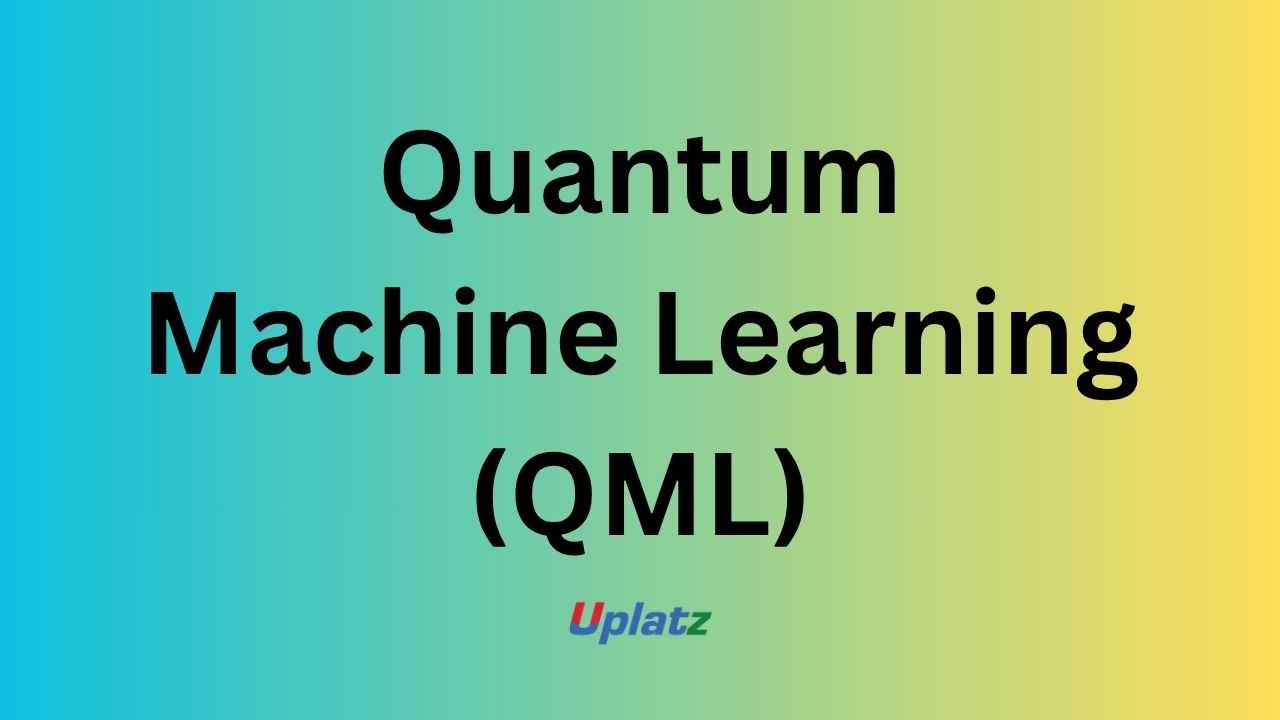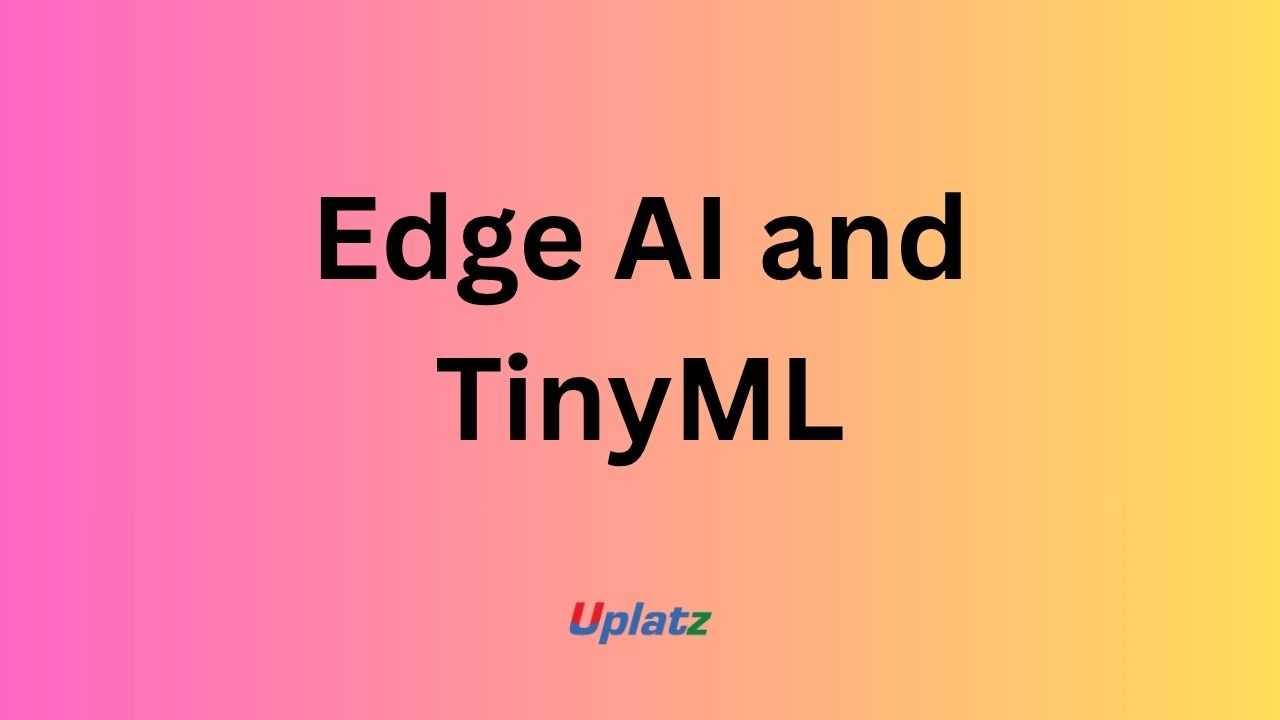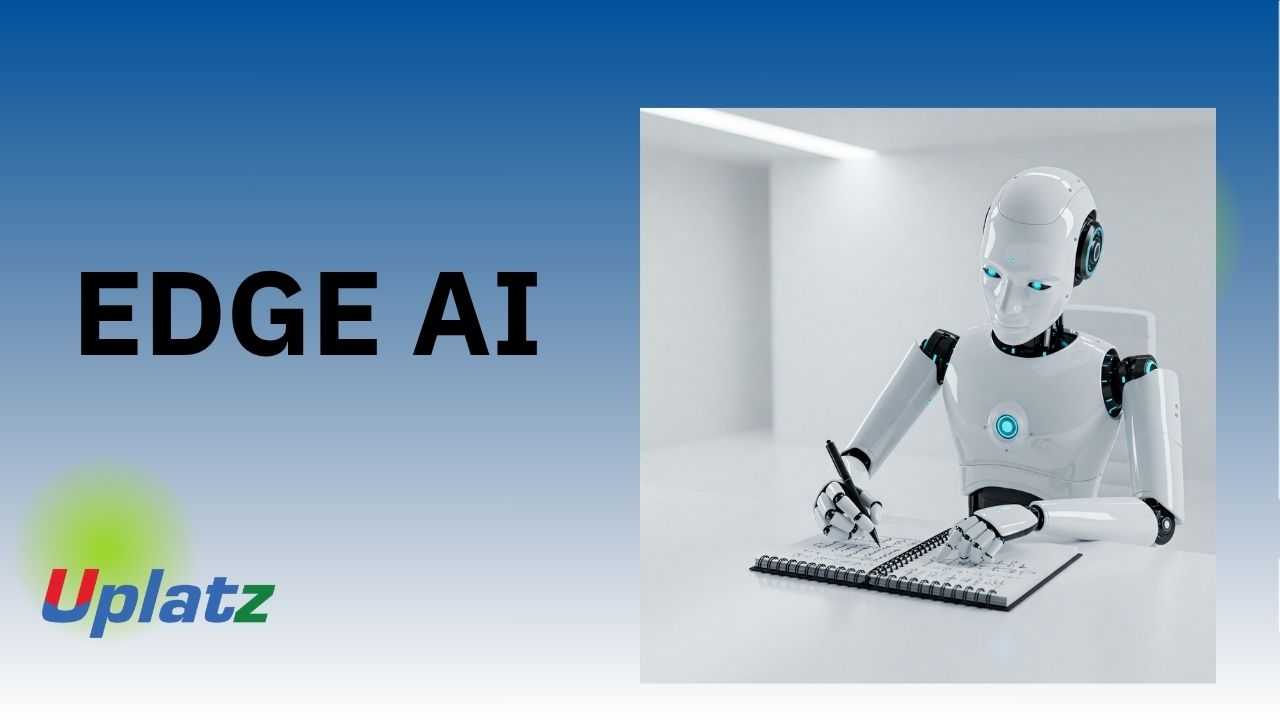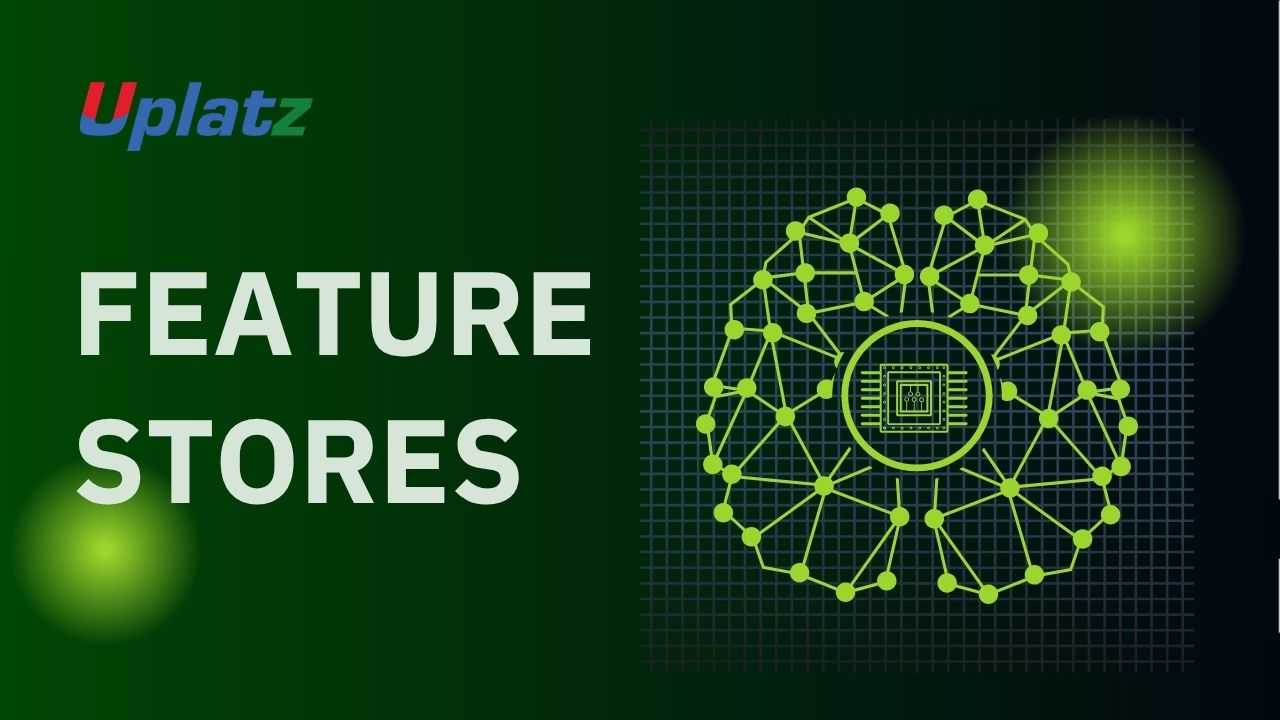Quantum Machine Learning (QML)
Leverage Quantum Computing to Accelerate and Enhance Machine Learning Models Price Match Guarantee
Full Lifetime Access
Access on any Device
Technical Support
Secure Checkout
Course Completion Certificate
Price Match Guarantee
Full Lifetime Access
Access on any Device
Technical Support
Secure Checkout
Course Completion Certificate
 97% Started a new career
BUY THIS COURSE (
97% Started a new career
BUY THIS COURSE (GBP 12 GBP 29 )-
 86% Got a pay increase and promotion
86% Got a pay increase and promotion
Students also bought -
-

- Edge AI and TinyML
- 10 Hours
- GBP 12
- 10 Learners
-

- Edge AI: Building Intelligent Systems at the Edge
- 10 Hours
- GBP 12
- 10 Learners
-

- EdgeDB
- 10 Hours
- GBP 12
- 10 Learners

Quantum Machine Learning (QML) brings together the power of quantum computing and the intelligence of machine learning, forming one of the most cutting-edge fields in modern technology. As quantum processors evolve, QML is shaping the future of optimization, pattern discovery, simulation, financial modelling, cryptography, and scientific computation.
This Uplatz course provides a comprehensive introduction to QML, blending theoretical clarity with practical, hands-on coding. You will explore quantum mechanics foundations, quantum circuits, variational algorithms, and hybrid quantum-classical models using popular frameworks such as Qiskit, PennyLane, Braket, and TensorFlow Quantum.
Designed for both beginners and AI practitioners, this course prepares you to understand and build next-generation intelligent systems powered by quantum computation.
🔍 What Is Quantum Machine Learning?
Quantum Machine Learning applies the principles of quantum computing — including superposition, entanglement, and unitary transformations — to enhance machine learning models that traditionally run on classical hardware.
Where classical ML operates on bits, QML uses qubits that can exist in multiple states simultaneously, enabling:
-
Parallel computation at the quantum level
-
Faster optimization and sampling
-
More expressive hypothesis spaces
-
Efficient modelling of high-dimensional data
Instead of replacing classical ML entirely, QML introduces hybrid architectures:
-
Quantum layers extract complex patterns
-
Classical neural networks handle feature processing
-
The system trains end-to-end using variational circuits
This hybrid paradigm is expected to become the backbone of future AI systems, especially for problems that are computationally intensive or impossible for classical devices to scale.
⚙️ How Quantum Machine Learning Works
Quantum Machine Learning integrates:
1. Quantum Computing Concepts
-
Qubits and quantum states
-
Quantum gates and circuits
-
Measurement and probability amplitudes
-
Bloch sphere representation
2. Machine Learning Principles
-
Parameterised models
-
Loss optimization
-
Gradient-based learning
-
Feature encoding and kernel methods
3. Hybrid Quantum-Classical Workflows
Quantum circuits are treated as layers in a neural network.
Parameters of quantum gates are trained using classical optimization.
The quantum computer produces states used for classification, clustering, or regression.
In this course, you will implement:
-
Quantum Neural Networks (QNNs)
-
Variational Quantum Circuits (VQCs)
-
Quantum kernels for classification
-
Quantum classifiers
-
Quantum Boltzmann machines
-
Quantum-enhanced generative models
You’ll learn how quantum properties accelerate ML tasks by providing new ways to encode data, explore optimization landscapes, and compress high-dimensional relationships.
🏭 How QML Is Used in the Industry
Quantum Machine Learning is beginning to transform industries where deep mathematical complexity, combinatorial optimization, or simulation accuracy play major roles. Leading companies such as IBM, Google, Amazon, Microsoft, NVIDIA, D-Wave, Rigetti, Pfizer, Volkswagen, and Goldman Sachs are actively investing in QML.
Real-world applications include:
1. Finance & Risk Modelling
-
Portfolio optimization
-
Fraud detection
-
Derivative pricing
-
Market simulation using quantum Monte Carlo methods
2. Drug Discovery & Molecular Simulation
Quantum computers simulate molecules and proteins more accurately than classical methods, accelerating discovery.
3. Cybersecurity & Cryptography
Quantum ML enables anomaly detection, threat modelling, and the development of post-quantum cryptographic tools.
4. Logistics & Optimization
Quantum optimization solves scheduling, routing, and supply chain problems much faster.
5. Natural Language Processing
Hybrid QML models enhance embeddings, semantic reasoning, and context modelling.
6. Image Processing & Computer Vision
Quantum convolutional models capture global patterns efficiently.
7. Scientific Research
Particle physics, chemistry, materials science, and energy systems rely heavily on QML simulations.
Understanding QML puts you ahead in industries preparing for the quantum-powered future of computation.
🌟 Benefits of Learning Quantum Machine Learning
Learning QML offers profound advantages:
-
Early Mastery of a Revolutionary Technology
Quantum computing is still new — professionals with QML skills are extremely rare and highly valued. -
Exponential Speedups in Problem Solving
Gain the ability to design systems for tasks that classical hardware cannot scale. -
Deep Understanding of Hybrid AI Systems
Learn how to combine quantum circuits with neural networks for real applications. -
Future-Proof Career Growth
QML expertise is in demand in research labs, AI startups, tech giants, and scientific institutions. -
Hands-On Experience with Real Quantum Tools
Practice using cloud-based quantum processors and simulators. -
Stronger Machine Learning Intuition
Quantum perspectives deepen your understanding of optimization, probability, and model expressiveness.
📘 What You’ll Learn in This Course
While the detailed syllabus sits separately, this course takes you through key learning milestones such as:
-
Fundamentals of quantum mechanics for AI
-
Qubit representation, gates, and quantum circuits
-
Encoding classical data into quantum states
-
Variational Quantum Algorithms (VQAs)
-
Hybrid quantum-classical neural architectures
-
Quantum kernels and quantum SVMs
-
Quantum generative models
-
Hands-on labs using Qiskit, PennyLane, and TensorFlow Quantum
-
Optimization techniques for noisy intermediate-scale quantum (NISQ) devices
-
Mini-projects in classification, clustering, and regression
-
Capstone project: full hybrid QML pipeline on real-world data
You’ll finish the course with practical skills to build and deploy QML models using both simulators and live quantum processors.
🧠 How to Use This Course Effectively
To get maximum benefit:
-
Start with Quantum Basics
Understand qubits, states, circuits, and measurements. -
Follow Hands-On Labs
Build quantum circuits in Qiskit and PennyLane along with the videos. -
Experiment with Hybrid Models
Add quantum layers to existing neural networks. -
Simulate and Compare
Test performance on simulators and cloud-based quantum hardware. -
Build Incrementally
Complete the mini-projects before moving to advanced models. -
Work on the Capstone Project
Integrate everything into one practical, portfolio-ready hybrid QML system. -
Review & Reinforce
Revisit quantum principles and ML integration techniques whenever needed.
👩💻 Who Should Take This Course
This course is ideal for:
-
Machine Learning Engineers
-
AI Researchers & Data Scientists
-
Quantum Computing Enthusiasts
-
Computer Science Students
-
Physicists & Mathematicians
-
Software Developers exploring next-generation technologies
-
Professionals seeking roles in quantum-AI industries
A basic understanding of Python and machine learning is helpful but not mandatory.
🚀 Final Takeaway
Quantum Machine Learning is shaping the future of artificial intelligence. By combining quantum computation with machine learning, QML unlocks unprecedented capabilities in optimization, simulation, modelling, and reasoning.
The Quantum Machine Learning Self-Paced Online Course from Uplatz equips you with everything you need to understand, build, and deploy QML systems — from foundational concepts to advanced hybrid architectures.
By the end of this course, you will be technically ready to contribute to cutting-edge research, industry innovation, or next-generation AI development that harnesses the true power of quantum computing.
-
Understand the fundamental principles of quantum computing.
-
Learn how quantum algorithms accelerate machine learning.
-
Implement quantum circuits using Qiskit and PennyLane.
-
Explore hybrid quantum-classical architectures.
-
Apply QML for classification, regression, and optimization tasks.
-
Compare quantum and classical ML performance.
-
Understand quantum kernels and variational circuits.
-
Simulate quantum models and visualize results.
-
Evaluate the current limitations and hardware challenges.
-
Prepare for research or engineering roles in quantum AI.
Course Syllabus
Module 1: Introduction to Quantum Computing and Qubits
Module 2: Quantum Gates, Circuits, and Measurements
Module 3: Classical vs Quantum Machine Learning – Key Differences
Module 4: Variational Quantum Circuits and Quantum Kernels
Module 5: Hybrid Quantum-Classical Architectures
Module 6: Quantum Algorithms – QAOA, VQE, Grover’s Search
Module 7: Building QML Models using Qiskit and PennyLane
Module 8: Quantum Data Encoding and Feature Mapping
Module 9: Applications – Optimization, Chemistry, and AI
Module 10: Capstone Project – End-to-End Quantum ML Workflow
Upon successful completion, learners receive a Certificate of Completion from Uplatz, validating their mastery of Quantum Machine Learning (QML). This Uplatz certification demonstrates your ability to apply quantum computing principles to enhance machine learning workflows and build hybrid models that push computational boundaries.
The certification aligns with the future of AI research, quantum hardware development, and advanced computational analytics, equipping you to explore frontier technologies in both academia and industry.
Holding this certificate positions you as a forward-thinking technologist capable of bridging two of the fastest-growing fields — Artificial Intelligence and Quantum Computing.
Quantum Machine Learning is one of the most cutting-edge and interdisciplinary domains today. By completing this course from Uplatz, learners can pursue roles such as:
-
Quantum Machine Learning Engineer
-
Quantum Software Developer
-
AI Research Scientist (Quantum Systems)
-
Quantum Data Scientist
-
Quantum Algorithm Engineer
Professionals in this emerging domain typically earn between $120,000 and $220,000 per year, with even higher ranges at research institutions and quantum hardware companies.
Career opportunities exist at Google Quantum AI, IBM Quantum, Rigetti, IonQ, Microsoft Azure Quantum, and specialized AI startups exploring hybrid computing. The course equips you with the conceptual grounding and practical toolkit to contribute to quantum-enhanced intelligence, a defining direction for the next generation of computing.
-
What is Quantum Machine Learning?
It’s the use of quantum computing to accelerate and improve machine learning tasks through quantum algorithms. -
What are qubits?
Quantum bits that can exist in superposition — representing both 0 and 1 simultaneously. -
What is superposition?
The ability of a quantum system to be in multiple states at once, enabling parallel computation. -
What is entanglement?
A phenomenon where quantum particles remain connected, sharing states instantaneously. -
What is a Variational Quantum Circuit (VQC)?
A parameterized quantum circuit optimized using classical methods for hybrid learning. -
How does QML differ from classical ML?
QML leverages quantum parallelism and interference for faster learning and better optimization. -
What frameworks are used for QML?
Qiskit, PennyLane, TensorFlow Quantum, and Braket SDK. -
What is Quantum Kernel Learning?
A technique that uses quantum feature maps to enhance classical kernel methods. -
What are the challenges of QML today?
Quantum noise, limited qubit counts, decoherence, and hardware instability. -
What are real-world applications of QML?
Drug discovery, portfolio optimization, material science, and complex pattern recognition.









